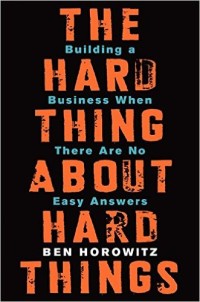The Hard Thing About Hard Things: Building a Business When There Are No Easy Answers
There are a bunch of business books that I want to read – and this one’s been on my list for a while, but they’re relatively expensive. But, I rediscovered the library! So I can read it for free. While I’d certainly rather own it, and frankly, I’d rather read it as an ebook than a hardback, it’s worth the tradeoff.
Premise: “the most important lesson in entrepreneurship: Embrace the struggle.”
In the first chapter or two, the most interesting thing so far is to realize that this renowned tech VC/entrepreneur certainly has a somewhat old school attitude towards his businesses. The mindset of his writing and lessons reminds me a lot more of “traditional” leadership than it does of the new wave of tech founders. I’ve been reading things like Rework and Reinventing Organizations lately, which skew young and techy and controversial, to some degree. But THTAHT is definitely more of a smack in the face to some of the new-gen principles. Below are some key quotes that help portray Horowitz’s views.
1) “Figuring out the right product is the innovator’s job, not the customer’s job.” This actually sounds like Steve Jobs – but it goes against a lot of Lean Startup type principles where customer desire and feedback drive your product development. This approach of design a product that you know the world needs before it does it also a key tenet of Peter Thiel’s Zero to One. The takeaway for me here is to remember that customer validation has limits, as does everything, and not to take it as gospel, even though I lean towards Lean methods more than complete unending of a market.
Key Takeaways: Lean doesn’t always win and Life of CEO at VC backed startup is rough
2) “Go home and tell your spouse that Ben needs you for the next 6 months”. Horowitz talks about the Darwin Project at one of his companies (Opsware) with the entire team working in the office for 12 hour days for 6 months. I completely get the idea of everyone working ridiculously hard for a block of time in order to keep the company alive and build something great, but again this goes against a lot of the value system that I want in a leader/company.
It’s also interesting to me to think about how a situation like this could work on a distributed team. It doesn’t necessarily feel like it’s possible, and really, their company probably would have gone out of business without it. I suppose I have to recognize that there are other forms of operation than the ones that I would prefer, and that in some cases, those more aggressive styles can achieve great things. That said, I’m still up in the air about whether I think it’s worth it. Obviously the andreessen horowitz team helped push people to the open internet, and that’s a terrific thing, but for this opsware product – yes they sold to HP, but was it worth the crazy lengths that they had to go to? This probably isn’t a good attitude for a VC-backed tech founder, but at this particular moment in my life, I’m not convinced VC-backed is the lifestyle that I want. I do want to build a great company, but it’s important to me to build one that’s sustainable and does right by employees and families. Even so, I’m glad that I’m finally reading this book because so far, so much of my reading has really only reinforced the particular way that I would prefer to operate, and Horowitz just gives a very different view on what success can look like.
3) “Peacetime CEO vs Wartime CEO”. Horowitz acknowledges that the roles and responsibilities of a CEO change dramatically based on how the company is doing. He even admits that different leaders will thrive under different conditions, and that being good in one of these roles doesn’t make you necessarily good at the other. When the company is growing, and generally healthy, a CEO’s role shifts towards recruiting, morale, and motivation. During wartime, the role focuses on daily survival and how to keep the company alive. In certain cases that can lead to extremely counter-intuitive decisions (like him selling off his core business at one company). At any company and for any leader, it’s important to understand which type of environment you’re operating in.
Do you prefer Ben’s cutthroat approach to management? You can’t argue with its effectiveness. I just hope that there’s a better way.



